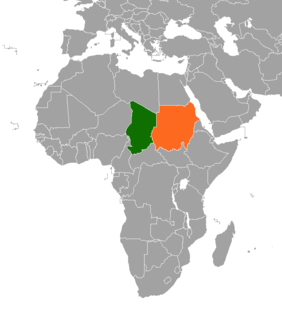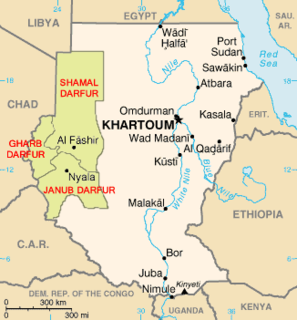
Field Marshal Omar Hassan Ahmad Al-Bashir is a Sudanese former military officer, politician and alleged war criminal who served as the seventh head of state of Sudan under various titles from 1989 until 2019, when he was deposed in a coup d'état. He was subsequently incarcerated, tried and convicted on multiple corruption charges. He came to power in 1989 when, as a brigadier general in the Sudanese Army, he led a group of officers in a military coup that ousted the democratically elected government of prime minister Sadiq al-Mahdi after it began negotiations with rebels in the south. He was elected three times as President in elections that have been under scrutiny for electoral fraud. In 1992, al-Bashir founded the National Congress Party, which remained the dominant political party in the country until 2019. In March 2009, al-Bashir became the first sitting head of state to be indicted by the International Criminal Court (ICC), for allegedly directing a campaign of mass killing, rape, and pillage against civilians in Darfur. On 11 February 2020, the Sudanese government announced that it had agreed to hand over al-Bashir to the ICC for trial.
The Fur are an ethnic group predominantly inhabiting western Sudan. They are concentrated in the Darfur region, where they are the largest ethnic group. They speak the Fur language, which belongs to the Nilo-Saharan family.
The Zaghawa people, also called Beri or Zakhawa, are a Sahelian Muslim ethnic group primarily residing in Fezzan North-eastern Chad, and western Sudan, including Darfur.

The most recent Chadian Civil War began in December 18, 2005. Since its independence from France in 1960, Chad has been swamped by the civil war between the Arab-Muslims of the north and the Sub-Saharan-Christians of the south. As a result, leadership and presidency in Chad drifted back and forth between the Christian southerners and Muslim northerners. When one side was in power, the other side usually started a revolutionary war to counter it.

Mediation of the Chadian-Sudanese conflict began shortly after the government of Chad declared an "état de belligérance", or 'state of belligerency' with Sudan. on December 23, 2005. The BBC translated "belligérance" as "war".
The Battle of N'Djamena was a battle between the forces of the revolutionary United Front for Democratic Change (UFCD) and the military of Chad that occurred on 13 April 2006 when rebel forces launched an assault on the capital of Chad in the pre-dawn hours, attempting to overthrow the government of President Idriss Déby Itno from their bases an estimated thousand miles east.
Sudanese literature are both oral as well as written works of fiction and nonfiction that were created during the cultural history of today's Republic of the Sudan. This includes the territory of what was once Anglo-Egyptian Sudan, the independent country's history since 1956 as well as its changing geographical scope in the 21st century.

The War in Darfur, also nicknamed the Land Cruiser War, is a major armed conflict in the Darfur region of Sudan that began in February 2003 when the Sudan Liberation Movement (SLM) and the Justice and Equality Movement (JEM) rebel groups began fighting against the government of Sudan, which they accused of oppressing Darfur's non-Arab population. The government responded to attacks by carrying out a campaign of ethnic cleansing against Darfur's non-Arabs. This resulted in the death of hundreds of thousands of civilians and the indictment of Sudan's president, Omar al-Bashir, for genocide, war crimes, and crimes against humanity by the International Criminal Court.

This is the bibliography and reference section for the Darfur conflict series. External links to reports, news articles and other sources of information may also be found below.

While there is a consensus in the international community that ethnic groups have been targeted in Darfur and that crimes against humanity have therefore occurred, there has been debate in some quarters about whether genocide has taken place there. In May 2006, the International Commission of Inquiry on Darfur organized by United Nations "concluded that the Government of the Sudan has not pursued a policy of genocide ... [though] international offences such as the crimes against humanity and war crimes that have been committed in Darfur may be more serious and heinous than genocide." Eric Reeves, a researcher and frequent commentator on Darfur, has questioned the methodology of the commission's report.

Tomo Križnar is a peace activist, notable for delivering video cameras in Southern Kordofan to the local ethnic Nuba civilians in order to help them collect the evidence of North Sudan military's war crimes against them. He wrote several books. He was also a special envoy of then Slovenian president Janez Drnovšek for Darfur.

Paul Salopek(born February 9, 1962 in Barstow, California) is a journalist and writer from the United States. He is a two-time Pulitzer Prize winner and was raised in central Mexico. Salopek has reported globally for the Chicago Tribune, Foreign Policy, The Atlantic, National Geographic Magazine and many other publications. In January 2013, Salopek embarked on the "Out of Eden Walk", originally projected to be a seven-year walk along one of the routes taken by early humans to migrate out of Africa, a transcontinental foot journey that was planned to cover more than 20,000 miles funded by the National Geographic Society, the Knight Foundation and the Abundance Foundation.

United Nations Security Council Resolution 1706, adopted on August 31, 2006, after recalling previous resolutions on the situation in Sudan, including resolutions 1556 (2004), 1564 (2005), 1574 (2004), 1590 (2004), 1591 (2005), 1593 (2004), 1663 (2006), 1665 (2006) and 1679 (2006), the Council expanded the mandate of the United Nations Mission in the Sudan (UNMIS) to include deployments in Darfur to enforce the Darfur Peace Agreement.
Events from the year 2007 in Chad.

The populations of eastern Chad and western Sudan established social and religious ties long before either nation's independence, and these remained strong despite disputes between governments. In recent times, relations have been strained due to the conflict in Darfur and a civil war in Chad, which both governments accuse the other of supporting.
Sudan Sunrise, Inc. is a 501c3 organization based out of Fairfax, Virginia. According to their mission statement, Sudan Sunrise strives for grassroots reconciliation, education and community building in order to lift up examples of peace and forgiveness between former enemies as alternatives to the history of violence in Sudan and South Sudan. Sudan Sunrise also facilitates local efforts in Southern Sudan to provide education, health care and community development.

Sudan–United Kingdom relations are foreign relations between Sudan and United Kingdom. Sudan has an embassy in London whilst the United Kingdom has an embassy in Khartoum. Most of the recent relations between the two countries centre on the region of Darfur.
United Nations Security Council Resolution 1935, adopted unanimously on July 30, 2010, after reaffirming all previous resolutions and statements on the situation in Sudan, the Council extended the mandate of the African Union – United Nations Hybrid Operation in Darfur (UNAMID) for a further 12 months until July 31, 2011 and demanded an end to fighting and attacks on United Nations personnel and civilians.

The Darfur genocide is the systematic killing of ethnic Darfuri people which has occurred during the ongoing conflict in Western Sudan. It has become known as the first genocide of the 21st century. The genocide, which is being carried out against the Fur, Masalit and Zaghawa tribes, has led the International Criminal Court (ICC) to indict several people for crimes against humanity, rape, forced transfer and torture. According to Eric Reeves, more than one million children have been "killed, raped, wounded, displaced, traumatized, or endured the loss of parents and families".
This article is a list of events in the year 2005 in Chad.